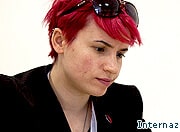Introducing polygamy in the wake of same-sex marriage might not be such a bad idea, according to a writer who has criticised the “tyranny of the heterosexual couple form”.
Writing in The Guardian, Laurie Penny said she “can’t be the only one” who wonders if there are some positives to multi-partner marriage.
And commenting on a recent BBC radio programme that predicted monogamy would lose its “moral monopoly” within 10 years, Miss Penny said: “Bring it on”.
Non-monogamy
She said: “Personally, I started practising non-monogamy in my early 20s as a statement against the tyranny of the heterosexual couple form and the patriarchal nuclear family”.
Miss Penny mocked warnings from opponents of same-sex marriage that polygamy could be next, and she remarked: “I can’t be the only one who wondered if that’d be such a bad idea.”
Miss Penny, who describes herself as a “journalist, author, feminist, troublemaker, utopian”, made the comments in the wake of a BBC programme on polygamy entitled Monogamy and the Rules of Love.
Choice
The programme featured a number of interviews with people in polyamorous relationships, which are intimate relationships between three or more people at the same time.
Presenter Jo Fidgen questioned whether there is still room for sexual fidelity in a “society where choice is everything”.
Miss Fidgen interviewed a ‘polyamorous family’ who share a house in Sheffield.
Charlie is a woman who has been married to Tom for six years. Tom is also in a relationship with Sarah, with Charlie’s approval.
Three parents
Subsequently, Sarah and Charlie also began a relationship. Then Sarah got engaged to a man called Chris. And Charlie tells the programme, “somewhere along the line I fell in love with Chris and now we’re all planning to grow old together”.
They all admitted that managing a relationship with multiple partners can be exhausting, but they say, “we don’t have a choice. We’re in love with each other”.
In February 2012 a Guardian blogger, Martin Robbins, claimed there are some “economic advantages” for children having three parents.

